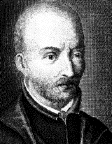| Profile | Major Works | Resources |
Luis de Molina, 1535-1600.

Spanish Jesuit scholar, who spent most of his career in neighboring Portugal, studying at the venerable University of Coimbra, and later became a teacher and leading scholar of the new Jesuit University of Evora. While commonly associated with the Salamanca School, Molina's theories should be considered part of a distinctive tradition, the 'Coimbra School', led by his humanist teachers, notably Pedro da Fonseca, the Jesuit provincial of Portugal and, at a more distant range, Lessius in Louvain.
Molina is best known in Catholic theology for his Concordia (1588), an attempt to reconcile the freedom of the will with the grace of God - what is known as "Molinism" in theological circles. This had been the principal question raised by Fonseca and the Coimbra school, but it was left to Molina to suggest the solution. Molina's thesis allows for Divine Grace to act upon Human Will, but only as an imperfect and neutral factor, so that man is ultimately in control of his own salvation. More precisely, he elaborated upon Fonseca's theory of 'foreknowledge' (or middle knowledge, scientia media), proposing that God has foreknowledge of which humans will try to act well of their own free will, and to these gives faith, although that grace is nowhere a determinant of the will.
To orthodox Dominicans, who embraced Aquinas's somewhat unsatisfactory formula that grace is universal and predetermines free will, Molina's thesis smelled like the old 5th C. Pelagian heresy (that denied the doctrine of Grace and placed man fully in control of his own salvation, a position condemned by St. Augustine). Although passing muster with the Portuguese Inquisition, Molina's thesis caused a firestorm in neighboring Spain, where the Dominicans were stronger Accused of Pelagianism, Molina and the Jesuits retorted by characterizing the Dominican emphasis on predestination as crypto-Calvinism.
The Pope convened a series of councils in Rome from 1597 to settle the quarrel, but for much of the next decade, they did little more than serve as a forum for Jesuits and Dominicans to rage at each other. At the end of the day, in 1607, the Dominicans had the upper hand and the council prepared to condemn Molina's doctrine as heresy, before Pope Paul V intervened at the last minute and declared that both views were consistent with Catholic theology and the church could live with the ambivalence. Molina did not live to see his vindication.
Molina's position on free human agency informed his theories of political philosophy. Most notably, he articulates a natural theory of civil government based on free human consent, rather than divine right. From here, Molina goes on a wide-ranging exploration of good government, which touches upon many issues of economics and economic policy. Molina rejected Duns Scotus's cost theory of "just price" because of the incentives to raise expenses artificially. He discussed competition and condemned "monopolies" as another way of artificially raising price. Argued that the "just price" is the natural exchange-established price by the free interchange of agents on the market. Also held that the value of money "arises from circumstances". In line with his general exaltation of human freedom, Luis Molina also articulated a strong condemnation of slavery.
['Molinism' became the Jesuit theology par excellence. Molina's authority was invoked in the famously bitter quarrel in France in the 1640s and 1650s against the Jansenists (a more unabashedly crypto-Calvinist Catholic sect) over grace and free will, a quarrel which would have tremendous political and social ramifications. Louis XIV sided decisively with the Jesuits, and broke the Jansenist-riddled institutions of learning in France, allowing the Jesuits to slip back into the center of political and scholarly life in France, from which they had been dislodged in the 1590s. As a result, later 18th C. Enlightenment thinkers, in an effort to break Jesuit control of schools, cited the quarrel with the Jansenists and characterized Molinism, to which they should have had a natural affinity, as an obscurantist and regressive doctrine, or at least turned into a weapon of obscurantism by later Jesuit scholars.]
|
Major Works of Luis de Molina
|
|
HET
|
|
Resources on Luis Molina
|
All rights reserved, Gonšalo L. Fonseca
